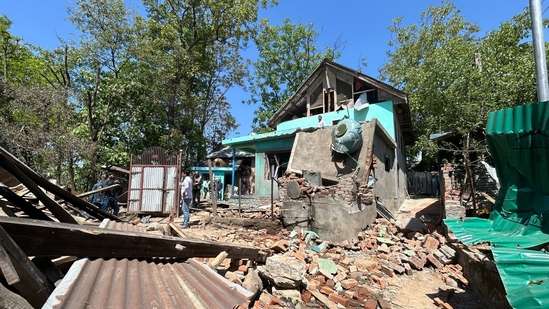
In a decisive move following the devastating Pahalgam terror attack, Indian security forces have demolished the homes of two Lashkar-e-Taiba (LeT) terrorists believed to be involved in the massacre that claimed 26 lives. The operation, carried out on the night of April 24, 2025, targeted the residences of Adil Hussain Thokar and Asif Sheikh in Jammu and Kashmir.
Adil Hussain Thokar, originally from Bijbehara in Anantnag district, has been named as a key mastermind behind the Pahalgam attack. Investigations reveal that Thokar traveled to Pakistan in 2018, where he underwent terror training before returning to the Valley last year. He is believed to have acted as a local guide for Pakistani militants, including Hashim Musa and Ali Talha, both implicated in the recent assault. Thokar has been labeled as the “most wanted” by Anantnag Police, who are offering a reward of ₹20 lakh for any information that could lead to his arrest.
Asif Sheikh, a resident of Tral in the Pulwama district, is believed to have been involved in planning the attack. Security forces, during search operations at their residences, encountered explosives planted within the houses, leading to their destruction. These blasts were not initiated by the forces but were a result of the concealed explosives detonating during the operation.
The Pahalgam attack, which occurred on April 22, 2025, targeted tourists in the scenic Baisaran meadow, resulting in the deaths of 25 Indian nationals and one Nepalese citizen, with 17 others injured. The assault, the deadliest since the 2008 Mumbai attacks, has been attributed to the Kashmir Resistance Front, believed to be a proxy for Pakistani-based groups like Lashkar-e-Taiba.
Following the attack, Prime Minister Narendra Modi pledged to take global action against those responsible, asserting that India will locate, pursue, and bring to justice every terrorist and their supporters. We will pursue them to the ends of the Earth.” Subsequently, India has downgraded diplomatic ties with Pakistan, suspended the Indus Waters Treaty, and closed its main border crossing, signaling a significant escalation in bilateral tensions.
The international community has expressed concern over the rising tensions between the nuclear-armed neighbors. Analysts warn that the breakdown of longstanding treaties like the Indus Waters Treaty and the Simla Agreement removes vital safety nets that have helped manage past crises between the two nations.
The demolition of the terrorists’ homes serves as a stern message to militant groups operating in the region. It underscores India’s commitment to eradicating terrorism and holding accountable those who threaten the nation’s security and peace.


